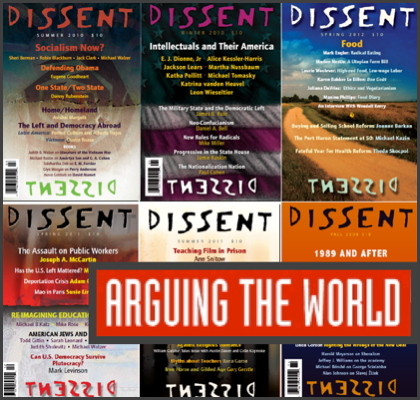A dispatch for the “Arguing the World” blog at Dissent magazine.
Published in Dissent.
Over the past decade, Reverend Billy has become a familiar face in social justice circles. He can often be found at protest events in his trademark white suit, priestly collar, and dyed-blond pompadour. When he’s performing, he speaks with the fervor of an evangelical preacher. Yet his message is, as he has put it, “post-religious.” He is focused on saving souls not from otherworldly hellfire, but from wanton consumerism and the ecological ravages of unrestrained capitalism.
I wrote a profile of Reverend Billy back in 2005, when his New York City-based performance troupe/congregation was still called the “Church of Stopping Shopping.” (It has subsequently been renamed the “Church of Earthalujah,” and the reverend has increasingly immersed himself in the fight against global climate change.) I noted then:
“Reverend Billy, the charismatic leader of the Church of Stop Shopping, is the creation of New York performance artist and avant-garde theater veteran Bill Talen. His Jimmy Swaggart-like persona may be rooted in parody, but Talen—who draws inspiration from ACT UP, the Guerrilla Girls, Lenny Bruce, and Abbie Hoffman—approaches his work with unusual seriousness. The reverend is his main focus year-round; he even earns a modest living from the character, doing lectures and residencies with arts organizations. When his choir belts out lyrics like “So it’s Christmastime, now let’s stop our shopping / Consumer confidence, yes oh yes it’s dropping,” it shows off vocal chops honed in weekly rehearsals. And when Talen delivers his sermons he is genuinely red-faced and beaded with sweat.
“We really are trying to figure out the addiction of consumerism,” Talen says. “Why do Americans shop this way? The advertisements persuade us that consumerism itself is democracy. They persuade us that it’s normal. But we think it’s unprecedented.“”
Lately, Reverend Billy has been active as a participant and popular speaker at #Occupy movement encampments. This past week, he visited Occupy London, addressing the demonstrators gathered outside St. Paul’s Cathedral, near the London Stock Exchange. He celebrated the spirit of crowd, lauded those assembled for “not living the product life,” and encouraged campers to persevere in cold weather: “Let’s remind ourselves all through the winter to be radically patient,” he called out, drawing cheers and hallelujahs in reply.
The London performance highlighted something I’ve thought about ever since first meeting Talen. On the one hand, Reverend Billy’s routine is easy to understand. It’s a campy appropriation of the costume and vocal inflections of the old-time revival preacher, put in the service of anti-corporate street theater. And it works. The performances are fun to watch. If you’re in New York over Thanksgiving, it’s even more fun to join one of the reverend’s marches through Manhattan shops on “Black Friday” (a.k.a. “Buy Nothing Day“), when he leads a festive flock in performing “retail interventions” at corporate chain stores.
At the same time, as someone who grew up on the Catholic left, there is something about Talen’s act that’s always been a bit confusing to me. When you think about it, we shouldn’t need an ironic borrowing of church mannerisms in order to hear a sermon against corporate greed. After all, why should railing against the evils of consumerism have to be done as a half-in-jest parody by a fake preacher? Shouldn’t our real preachers be doing the same thing in earnest?
In this respect, Reverend Billy’s act is an indictment of Christian religious leaders—a routine that points to that failure of most mainstream ministers to join with movements for social and economic justice, to champion public demonstrations, and to be outspoken and unafraid in denouncing the idolatry of the market. If greater numbers of actually ordained ministers were stepping up to give their own rousing speeches to protest encampments—and bringing their own gospel choirs with them—Talen’s shtick would hardly be necessary.
To their credit, some religious leaders have spoken out. Some 300 congregations and religious officials signed a statement in October supporting the values of Occupy Wall Street. A variety of clergy members have offered religious services at Zuccotti Park, and others have helped with donations of food or tents from their organizations. On the part of the Catholic Church, a few weeks ago the Vatican released a document calling for regulation of the financial sector, declaring support for a “Robin Hood” tax on speculation, and warning against the “inequalities and distortions of capitalist development.”
More dramatically, at the very place Reverend Billy was speaking last week, a prominent member of the clergy resigned over the Church of England’s treatment of the Occupy London encampment. As the Guardian reported, “The canon chancellor of St Paul’s Cathedral, the Rev. Dr. Giles Fraser, has resigned in protest at plans to forcibly remove protesters from its steps, saying he could not support the possibility of ‘violence in the name of the church.’”
The Guardian further reported that “a part-time cleric also resigned” in protest, and that the events have thrown the leadership of the cathedral into turmoil. The controversy has resulted in criticism of the Anglican establishment—not only for mishandling the protest camp, but also for being insufficiently vocal in denouncing financial sector recklessness before having the spotlight shined on them by the #Occupy actions.
The resignations by St. Paul’s dissidents are a bold statement about which side the churches should be taking in the fight against corporate greed. For the time being, there’s still plenty of space for Bill Talen’s act. But if more clergy members start following Giles Fraser’s courageous example and begin making significant personal sacrifices to support the #Occupy movement, the real preachers might just put Reverend Billy out of business.
